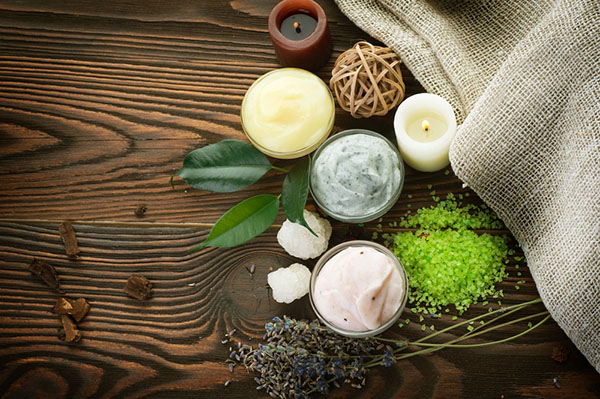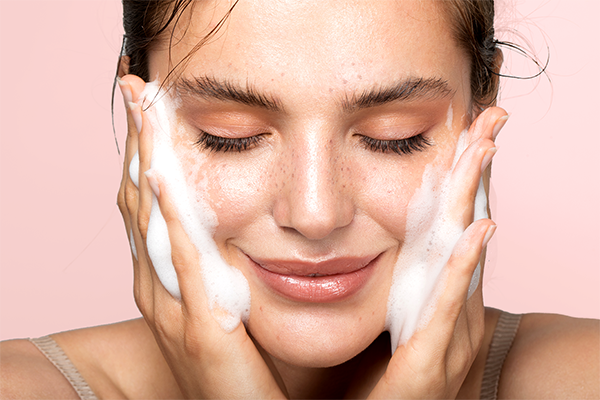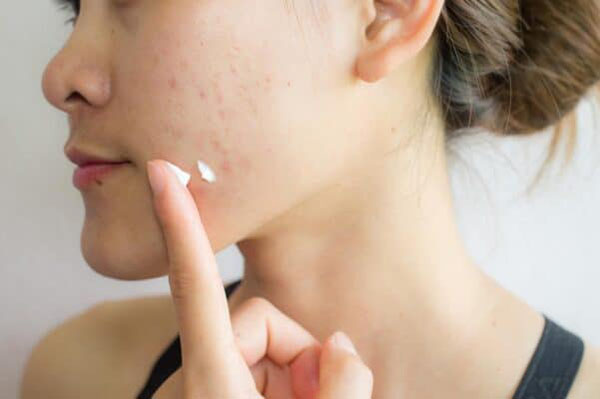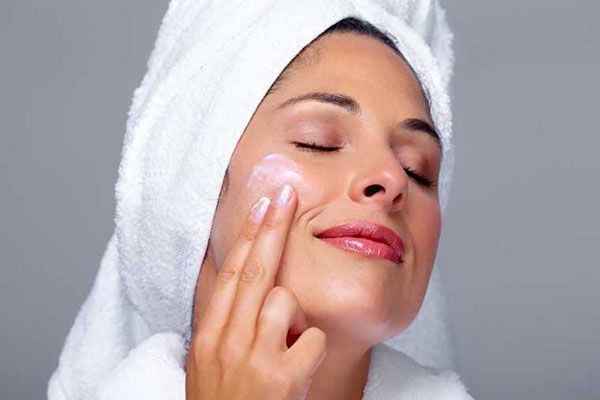What is sensitive skin? Do you have sensitive skin? How do you know your skin is sensitive?
If you want to know whether your type of skin is sensitive, the best way is to go to see a dermatologist, or there are more simple ways for you to identify. Let’s take a quick look at some common signs below and assess by yourself:
- Your skin is reactive
- Your skin is dry
- You notice redness
- You develop rashes often
- You’re prone to breakouts
- You get sunburned easily
As a result, intensive care is necessary to prevent your sensitive skin from getting damaged, especially in a harsh environment like this, taking care of it seems to be one of the main priorities. Now, let us show you some home remedies and practices that you can follow to protect yourself.
Which ingredients are good for sensitive skin?

Aloe vera
Aloe vera is known as one of the best natural moisturizers for sensitive skin, as it is mild and does not cause skin irritation. It is also rich in antioxidant compounds, which can help to inhibit the growth of harmful bacteria. Moreover, Aloe vera can soothe inflamed and irritated skin. If you get sunburn, you can apply cooling aloe vera to your skin to calm it down.
How to use it?
- Cut the head of the leaf of an aloe plant.
- Use a pestle and squeeze out the gel from inside.
- Then apply the gel on any affected areas or just your face and neck.
- Let it dry overnight and wash off the next day.
- After applying the gel, it is usual to get mild itchiness, so don’t worry.
Honey
Honey is considered to be friendly for those having sensitive skin. Since it has anti-inflammatory, antibacterial and antiseptic properties, honey can cleanse the skin deeply and enhance moisture level of skin. In addition to this, honey can prevent bacterial infection, heal wounds and eczema.
How to use it?
- Add 2 tsp of honey and 2 tsp of cinnamon powder in a bowl and mix well. Or mix 2 tsp of honey and 1 tsp of aloe vera gel.
- Apply this mixture on your face and neck and let it sit here for 10-20 minutes.
- Then wash off with lukewarm water and pat to dry.
- Doing 2 or 3 times per week will make your skin supple and smooth.
Oatmeal
As oatmeal has anti-inflammatory properties, it is always used for bathing. It can exfoliate, soften skin gently and can also soothe irritation. This is why oatmeal is an ideal ingredient for sensitive skin.
How to use it?
- Mix 2 tsp of oatmeal and 2 to 3 tsp of yogurt until the mixture is pasty.
- Then apply it to your face and let it sit here for 10-15 minutes or until it dries.
- Next, wet paper towels with hot water to wipe off.
- Finally, wash your face with lukewarm water and pat it to dry.
Shea butter
Shea butter is a popular superfood for sensitive skin. It is rich in essential fatty acids and contains fat, which facilitates the production of collagen and therefore slows down the aging process. Shea butter can be used as natural lip balm, hand cream and body butter to rescue the dry and parched skin.
How to use it?
- Directly apply shea butter on your skin.
- Massage until it is absorbed.
- But note that it is slippery, so it is best to use it at night before bed.
Overripe Banana
Although overripe bananas are ugly and make you want to throw them away, their rich vitamins may help you change your mind. This fruit is helpful to get rid of dead skin cells and block moisture, so your skin does not feel itchy and dry.
How to use it?
- Mash an overripe banana in a bowl.
- Add 2 tsp of curd, 1 tsp of honey and mix all well. Or add ½ tsp of honey, ½ cup of oatmeal cooked with milk, and 1 egg.
- Apply on your face, massage in circular motions, and leave it here for 15 minutes.
- Wash off and pat dry.

Which other ways are effective for sensitive skin?
Besides using the natural ingredients above, we also provide you with a list of sensitive skin tips that develop your skin’s ability to protect itself.
Hydrate yourself
When you have sensitive skin, it is very easy to get dehydrated, which can cause breakouts. Thus, staying hydrated helps your skin look healthier and plumper. There are various ways to hydrate your skin, but the easiest one is drinking water. In general, you should try to drink between half an ounce and an ounce of water for each pound you weigh every day. For example, if you weigh 150 pounds, that would be 75 to 150 ounces of water per day. If you are not sure whether you are getting enough to drink, you can check your urine for a pale-yellow color, which shows you are pretty hydrated.
Moisturize your skin regularly
Once your skin is moisturized well, it will improve hydration, reduce irritation and help restore the skin’s outermost layer. So it is necessary to add the moisturizing step into your skincare routine, if your skin is sensitive. Select your moisturizer carefully; highly recommend those that are high in fatty acids like shea butter, olive oil, almond oil, and coconut oil to enhance hydration and lock in moisture.
Apply sunblock regularly
To protect your sensitive skin from sun damage, you should wear sunscreen daily that has an SPF of 15 or higher. Remember to apply sunscreen whenever you go outside, even on cloudy days. In case your sunscreen causes skin irritation, choose sunscreen that is hypoallergenic and free of fragrances and dyes.Additionally, you should wear sunglasses and protective clothing to protect your skin.
Avoid hot and long bath
Soaking in hot water for long hours can wash away protective oils on your skin, which can dry out your skin and lead to irritation, dehydration and red spots. Although hot baths make us feel relaxed and unwind, gradually it may adversely affect your skin’s health. Instead, you can use lukewarm water to protect your sensitive skin from sudden temperature changes.
Wash your face
Since you have sensitive skin, it is prone to irritation, so you should avoid face cleansing that contains exfoliant. If gentle cleansers don’t work for you, you should wash your face with just cool water, then pat dry with a soft cloth instead of rubbing with a harsh towel, or it might cause redness and bumps.
Washing your face regularly and gently helps your skin stay hydrated and clean out pollutants clogging your pores. When you are outside, remember to always keep a pack of cleansing wipes in your bag to get rid of dirt and impurities.
Care what you eat
We protect our skin not only from outside but also from within. So it is crucial to have a healthy diet to maintain skin health. Below we have listed some kinds of foods that you should add to your diet every day.
- Organic fruits and veggies like blueberries, apples, tomatoes, and leafy greens
- Orange-colored fruits and veggies like pumpkin, sweet potatoes, carrots, and kinds of tropical fruits
- Healthy fat sources such as nuts, avocadoes, and olive oil
- Healthy carbs like squashes, beans, berries, and whole grains
- Cold-water fish such as herring, salmon, and sardines
Additionally, you can try the Mediterranean diet, because it has a higher consumption of veggies, fruits, nuts, fish, healthy oils, and whole grains. Another good tip is to add some so-called beauty supplements to your diet to nourish your skin from inside.
Watch what you buy
Last but not least, you need to be careful and mindful of all your skin care products, including face masks, cleansers, soaps, and moisturizers. Buy the products that are labeled “hypoallergenic” or “no artificial colors.” Before applying a certain product to your skin, remember to perform a patch test and give your skin about 48 hours to see any skin reaction, or it’s better to consult your dermatologist.
Sensitive skin can be easily managed if you follow the natural skincare tips above. Be mindful of what you do, what you eat, and where you go to soothe and protect your skin
- Related post: How to whiten skin with lemon?



